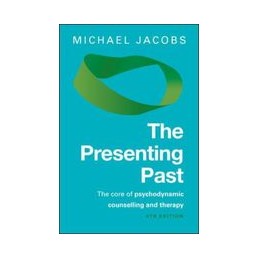- Obniżka


 Dostawa
Dostawa
Wybierz Paczkomat Inpost, Orlen Paczkę, DHL, DPD, Pocztę, email (dla ebooków). Kliknij po więcej
 Płatność
Płatność
Zapłać szybkim przelewem, kartą płatniczą lub za pobraniem. Kliknij po więcej szczegółów
 Zwroty
Zwroty
Jeżeli jesteś konsumentem możesz zwrócić towar w ciągu 14 dni*. Kliknij po więcej szczegółów
This new edition of The Presenting Past is a wonderfully readable overview of the developmental principles underlying psychodynamic counselling. Theories of Freud, Klein, Bowlby, Winnicott, Kohut and others are organized into three broad developmental themes:: trust and attachment; authority and autonomy; and cooperation and competition. It is illuminated with rich clinical examples which bring alive how theory is helpful to understanding clients. Jacobs lucid, lively style makes the connection between theory and practice clear and accessible. This outstanding book will appeal to established clinicians as well as students training in counselling and psychotherapy.
Jan Grant, Associate Professor, Counselling Psychology, Curtin University, Western Australia
Michael Jacobs is a free spirit who roams purposefully in the often contentious world of the rival psychoanalytic traditions.
Professor Brian Thorne, Centre for Counselling Studies, University of East Anglia, UK
An original and reliable approach to the development of personality that every therapist and student therapist should possess. Jacobs, one of the founders of psychodynamic therapy and counselling, avoids the twin perils of unimaginative, meaningless causality on the one hand and indifferent, irresponsible reference to fate on the other.
Andrew Samuels, Professor of Analytical Psychology, University of Essex, UK
In this fourth edition of what is a seminal text on psychodynamic ways of working, Michael Jacobs has managed to take the reader through the complex and intricate ways of thinking about what it is to be human from a psychodynamic view of the world. This text has been recommended reading for undergraduates that I teach who are studying the world of counselling and helping and it continues to be a text that they draw on when faced with a difficulty in understanding the ideas and concepts of the psychodynamic approach. Michael Jacobs has that rare ability to make complicated ideas and concepts seem understandable and yet leave the reader in no doubt that they are complicated. The use of case material brings the theory to live and mirrors Michaels commitment to practice that is informed by theory. This is a vade mecum and Michael has done the job.
Sue Sully, Senior Lecturer in Counselling and Psychotherapy, University of Brighton, UK
A persons past is ever present, from infancy to old age, and it affects the dynamics of therapy and the therapist-patient relationship.
Written by a key founding figure of psychodynamic counselling and one of most-cited counselling authors in Europe, the bestselling The Presenting Past gives practicing therapists and students keen insight into the subject. The theories of Freud, Winnicott, Klein and attachment theorists are organized into three main categories:: trust and attachment; authority and autonomy; and cooperation and competitiveness.
In this new edition, Michael Jacobs gives psychodynamic counselling and therapy a truly human face. He brings practice to the forefront in a new three-part structure. This is realized through the swift introduction of the themes in the therapeutic relationship throughout the book, making integration of theory and practice clearer than ever. Looking at what the client presents as troubling them, what the therapist experiences about the client and their relationship in therapy and exploring theories to throw light on these themes now lies firmly at the core of the book.
Fully updated with new references, The Presenting Past stays wonderfully readable. The book shows Jacobs at his best and is a testimony to his lifetime of experience.
Opis
The relevance of the past
Part 1: Trust and Attachment
Trust and attachment: foundations
Trust and attachment: towards ambivalence
Trust and attachment: in adulthood and in therapy
Part 2: Authority and Autonomy
Authority and autonomy: internalizing parental authority
Authority and autonomy: a matter of control
Authority and autonomy: in adulthood and in therapy
Part 3: Co-operation and Competition
Cooperation and competition: gender, sexuality and sexual relations
Cooperation and competition: Oedipal configurations
Cooperation and competition: related issues
Bibliography
